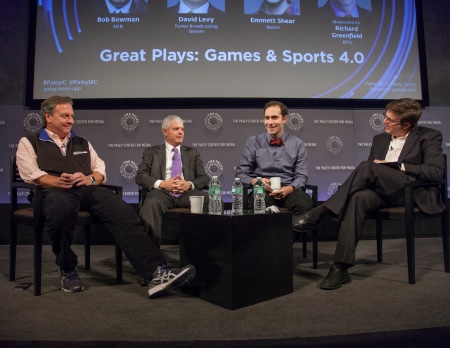Mobile Matters
The smarter way to stay on top of the multichannel video marketplace. Sign up below.
You are now subscribed
Your newsletter sign-up was successful

New York – Major League Baseball Business and Media president Bob Bowman said the media industry still hasn’t quite put its finger on the true viewing habits of millennials, but he does know one thing: whatever is offered to them better be on mobile.
“They’re spending a lot of time on their screens, but I don’t think we know how they are going to buy and watch content,” Bowman said at a panel session at the Paley Center for Media’s Media’s 2015 Paley International Council Summit here Friday. “All we know is that if it’s not on a mobile device it’s not going to matter and that pricing matters. Beyond price and mobile, we haven’t learned a lot.”
Sports programming has been one of the few linear television successes because of its immediate nature – “No one watches the Super Bowl on Monday,” said Turner Broadcasting System president David Levey. And while its status as “appointment TV” has helped it with advertisers, Turner is branching out into a new area – eSports – that it hopes will capture both a digital and traditional TV audience.
Twitch founder and CEO Emmett Shear said E-Sports is garnering a huge following among millennials – about 2 million viewers watched the League of Legends championship series, a role playing video game, on the service recently. While Shear said mobile viewing is less with gamers, it is starting to gain some momentum, with about 25% of its viewership via mobile devices.
“Nobody wants to watch the world’s best Candy Crush player yet,” Shear said.
Turner recently bought into eSports business, announcing in September that it will launch a new Counter Strike: Global Offensive league in partnership with WME/IMG that will air weekly on TBS.
Levy said the strategy is to stage two 10-week long seasons in 2016, with Tuesday, Wednesday and Thursday matches provided digitally and Friday finals matches on TBS.
The smarter way to stay on top of the multichannel video marketplace. Sign up below.
While mobility is the future, Bowman said that doesn’t mean the traditional TV model is disappearing, it’s just evolving. And while sports has been a costly programming item for networks he added that he believes affiliate fees will remain stable and even grow.
“I don’t think fees are going to fall,” Bowman said. “I do think people like David [Levy] are going to ask for different rights. What’s going to happen, even in mid-deal, is that they will pay us as much or more but ask for more rights. How they deliver that content is what’s going to broaden for people like David.”
And though programmers have complained for years about the high cost of sports, Levy said he doesn’t see those charges declining in the near future.
“It’s a supply and demand marketplace,” Levy said. “There are people that want stuff and there are people that need stuff. New networks like Fox Sports [1], they’re going to need a lot of product and companies like ours want a lot of product.”
But he added that if pay TV subscribers continue to decline, there is going to need to be some correction to offset lost revenue, but didn’t elaborate.
